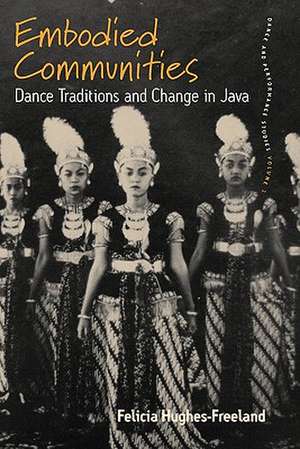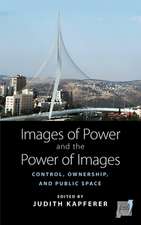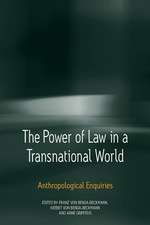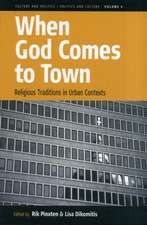Embodied Communities: Dance and Performance Studies, cartea 2
Autor Felicia Hughes-Freelanden Limba Engleză Paperback – 31 oct 2010
"This is a valuable addition to the literature on performance in Southeast Asia, on dance history, and on culture change in general ... a very timely and important work ... the quality of its prose, the depth of research involved make it a unique contribution to dance scholarship." · Hélène Bouvier, CNRS, Paris
Court dance in Java has changed from a colonial ceremonial tradition into a national artistic classicism. Central to this general transformation has been dance's role in personal transformation, developing appropriate forms of everyday behaviour and strengthening the powers of persuasion that come from the skillful manipulation of both physical and verbal forms of politeness. This account of dance's significance in performance and in everyday life draws on extensive research, including dance training in Java, and builds on how practitioners interpret and explain the repertoire. The Javanese case is contextualized in relation to social values, religion, philosophy, and commoditization arising from tourism. It also raises fundamental questions about the theorization of culture, society and the body during a period of radical change.
Felicia Hughes-Freeland is an anthropologist and filmmaker. She is a Reader in Anthropology, Dept of Geography, School of the Environment and Society, Swansea University. She has done extensive research in Indonesia on Javanese dance over a period of nearly thirty years and her articles have been widely published. Her edited books and ethnographic films include Ritual, Performance, Media and The Dancer and the Dance.
| Toate formatele și edițiile | Preț | Express |
|---|---|---|
| Paperback (1) | 262.32 lei 6-8 săpt. | |
| BERGHAHN BOOKS INC – 31 oct 2010 | 262.32 lei 6-8 săpt. | |
| Hardback (1) | 751.54 lei 6-8 săpt. | |
| BERGHAHN BOOKS INC – 31 oct 2008 | 751.54 lei 6-8 săpt. |
Preț: 262.32 lei
Nou
Puncte Express: 393
Preț estimativ în valută:
50.19€ • 52.41$ • 41.54£
50.19€ • 52.41$ • 41.54£
Carte tipărită la comandă
Livrare economică 05-19 aprilie
Preluare comenzi: 021 569.72.76
Specificații
ISBN-13: 9781845452384
ISBN-10: 1845452380
Pagini: 304
Dimensiuni: 152 x 229 x 16 mm
Greutate: 0.41 kg
Editura: BERGHAHN BOOKS INC
Seria Dance and Performance Studies
ISBN-10: 1845452380
Pagini: 304
Dimensiuni: 152 x 229 x 16 mm
Greutate: 0.41 kg
Editura: BERGHAHN BOOKS INC
Seria Dance and Performance Studies
Notă biografică
Felicia Hughes-Freeland is an anthropologist and filmmaker. She has done extensive research in Indonesia on Javanese dance over a period of nearly thirty years and her articles have been widely published. Her edited books and ethnographic films include Ritual, Performance, Media and The Dancer and the Dance.
Cuprins
List of Figures and Tables Preface and Acknowledgements A Note on Spelling and Other Matters Abbreviations Chapter 1. Introduction: Dance, Culture and Embodiment Chapter 2. Before the Nation: The Heyday of Court Dance Chapter 3. From Colony to Nation: Dance in the Reign of Hamengkubuwana IX (1940-1988) Chapter 4. Embodying Culture: Dance as Education Chapter 5. Performance and Symbolism: Bedhaya and the Poetics of Power Chapter 6. The Art of Dancing: Joged Mataram Chapter 7. Changing Styles of Patronage: Tourism and Commoditization Chapter 8. Conclusion: Embodied Communities in the Nation State Appendices Glossary Bibliography Index
Recenzii
"This is a valuable addition to the literature on performance in Southeast Asia, on dance history, and on culture change in general - a very timely and important work - the quality of its prose, the depth of research involved make it a unique contribution to dance scholarship." * Helene Bouvier, CNRS, Paris




























